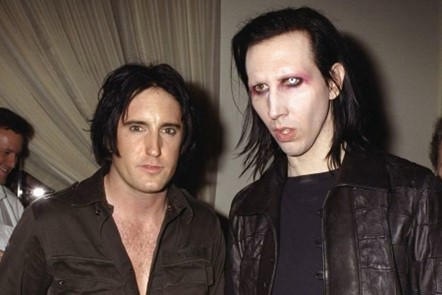The Golden Age of Collaboration with Trent Reznor

Marilyn Manson, the controversial musician known for his provocative and dark style, has left an indelible mark on the music world since his debut in the 1990s. However, his success has never been the same since he parted ways with his long-time collaborator, Trent Reznor, the leader of Nine Inch Nails. The partnership between Manson and Reznor was an explosive combination that spawned some of the most influential albums of the era, but since their split, Manson’s impact has noticeably diminished.
A Creative Alliance that Shook the Foundations of Music
The collaboration between Marilyn Manson and Trent Reznor began in the mid-1990s and resulted in landmark albums such as “Portrait of an American Family” (1994) and “Antichrist Superstar” (1996). Together, they created a unique visual and musical aesthetic that combined provocative lyrics with an industrial and aggressive sound. This partnership not only elevated Manson’s career, but also cemented his status as a rock icon.
After Separation: A Decline in Relevance
However, since the separation of Reznor and Manson, the impact of the latter has been steadily diminishing. Their latest albums have gone unnoticed compared to previous releases, and their popularity has declined considerably. Despite his attempts to stay relevant, audiences no longer seem so interested in his music.

Dependence on His Ancient Glory
It is evident that Marilyn Manson still relies heavily on his association with Trent Reznor to maintain his status in the music industry. Their live performances usually include songs from the albums they created together, and this shows a lack of evolution and creativity in their solo career. Manson seems stuck in the past, unable to find a new musical direction that resonates with his current audience.
The Lack of Innovation and Originality
Another aspect that has affected the success of Manson’s recent albums is the lack of innovation and originality in his music. His songs have followed a predictable and repetitive pattern, which has led to a loss of interest on the part of the public. Manson has failed to reinvent himself or offer something new and exciting in his latest productions, which has led to a decline in his cultural impact and critical reception.

The Power of Collaboration in Art
After the breakup between Marilyn Manson and Trent Reznor reminds us of the power of collaboration in art. The synergy between two talented artists can propel your creativity to new heights and have a lasting impact on popular culture.
In Manson’s case, his partnership with Reznor was a driving force behind his early success, and the lack of a similar collaboration has left a creative void in his career.

The Importance of Evolution and Adaptation
To stay relevant and remain a creative force in the music industry, Marilyn Manson must learn to evolve and adapt. Surrounding yourself with new collaborators and exploring new genres and styles could be the way to revitalize your career and regain your lost cultural impact. Change and experimentation are essential for any artist who wants to stay at the forefront of music.
The Future of Marilyn Manson
Although Marilyn Manson has experienced a decline in his success after his split with Trent Reznor, it remains to be seen what the future holds for this iconic musician. The music industry is unpredictable, and the resurgence of artists at unexpected times is not uncommon. If Manson can find a new creative direction and reinvent himself, he may be able to regain his place in the music scene and make a lasting mark again.
In conclusion, Marilyn Manson’s success after his split with Trent Reznor has declined markedly. His reliance on association with Reznor and a lack of innovation in his music have been key factors in his decline. To stay relevant, Manson must seek new collaborations and explore new creative horizons. Only then can you revitalize your career and regain your lost cultural impact. Marilyn Manson’s future is in his hands, and only time will tell if he can once again excel in the music industry.
For more articles like this, click here









